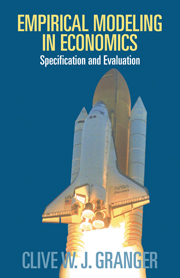1 - The specification of empirical models
Published online by Cambridge University Press: 22 September 2009
Summary
Models and changes
On May 25, 1961 President John F. Kennedy issued a challenge to the scientists and engineers of the United States to put an American on the moon by the end of the decade. The first moon landing took place on July 20, 1969. To meet the challenge many research problems had to be solved in rocketry, control theory, materials science, and in other fields. This was successfully completed in the appropriate sequence, within the dead-line and, I believe, within the cost constraints imposed by Congress. This is an example of a successful challenge. It had substantial funding attached and the researchers embraced it with some enthusiasm, clearly believing that the objective was achievable. In contrast, on May 18, 1997, President William J. Clinton challenged the US health community to find a vaccine to prevent AIDS within the next decade but he did not promise extra funding. The response was muted, some saying that the challenge was impossible, some that it would be better to try to find a cure for AIDS rather than a preventative vaccine and there has been little discussion of this challenge since.
How would economists respond to a similar challenge? Economists in a country could be asked to attempt to solve, or at least reduce, some particular economic problem.
Information
- Type
- Chapter
- Information
- Empirical Modeling in EconomicsSpecification and Evaluation, pp. 1 - 32Publisher: Cambridge University PressPrint publication year: 1999
